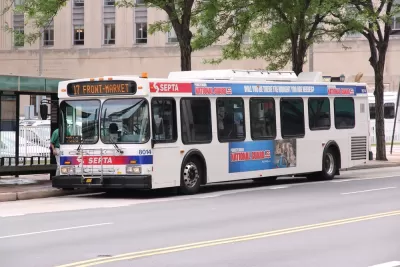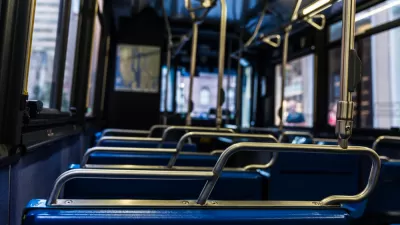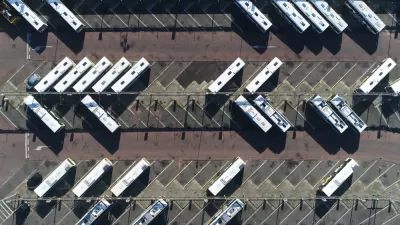As rainy day funds and federal aid dwindle, transit agencies formerly reliant on farebox revenue are exploring new ways to fund their operations.

Transit agencies in some of the biggest U.S. cities “are facing a fiscal cliff,” according to one in a series of Governing articles that outline the prospects of transit agencies around the country.
As Jake Blumgart writes, “It is worth noting that the vast majority of American transit systems do not rely on fares for much of their budget. Their ridership is overwhelmingly comprised of lower-income passengers, who have not had the luxury of remote work during the pandemic.” But for agencies in big cities where remote work made a big impact on ridership and revenue, the drastic change in how people use transit could mean an existential crisis.
The article describes an analysis by TransitCenter of transit systems in New York, Philadelphia, and Chicago. New York’s Metropolitan Transportation Authority (MTA) doesn’t face a budget shortfall until 2025, in part thanks to its “expansive” ability to borrow money. But to maintain the system long-term, the agency needs new sources of funding, such as the city’s congestion pricing program. Philadelphia’s Southeastern Pennsylvania Transportation Authority (SEPTA), meanwhile, is cushioned by a rainy day fund that the state requires transit agencies to maintain. In Chicago, the Regional Transportation Authority (RTA) is relying on the generous amount of federal aid it received, as well as a local sales tax on online sales that contributes to the agency’s revenue.
All three agencies, however, expect to face budget shortfalls by the end of 2025.
FULL STORY: For Mass Transit Agencies, a Fiscal Cliff Looms (Part II)

Alabama: Trump Terminates Settlements for Black Communities Harmed By Raw Sewage
Trump deemed the landmark civil rights agreement “illegal DEI and environmental justice policy.”

Study: Maui’s Plan to Convert Vacation Rentals to Long-Term Housing Could Cause Nearly $1 Billion Economic Loss
The plan would reduce visitor accommodation by 25% resulting in 1,900 jobs lost.

Planetizen Federal Action Tracker
A weekly monitor of how Trump’s orders and actions are impacting planners and planning in America.

Waymo Gets Permission to Map SF’s Market Street
If allowed to operate on the traffic-restricted street, Waymo’s autonomous taxis would have a leg up over ride-hailing competitors — and counter the city’s efforts to grow bike and pedestrian on the thoroughfare.

Parklet Symposium Highlights the Success of Shared Spaces
Parklets got a boost during the Covid-19 pandemic, when the concept was translated to outdoor dining programs that offered restaurants a lifeline during the shutdown.

Federal Homelessness Agency Places Entire Staff on Leave
The U.S. Interagency Council on Homelessness is the only federal agency dedicated to preventing and ending homelessness.
Urban Design for Planners 1: Software Tools
This six-course series explores essential urban design concepts using open source software and equips planners with the tools they need to participate fully in the urban design process.
Planning for Universal Design
Learn the tools for implementing Universal Design in planning regulations.
Caltrans
Smith Gee Studio
Institute for Housing and Urban Development Studies (IHS)
City of Grandview
Harvard GSD Executive Education
Toledo-Lucas County Plan Commissions
Salt Lake City
NYU Wagner Graduate School of Public Service





























